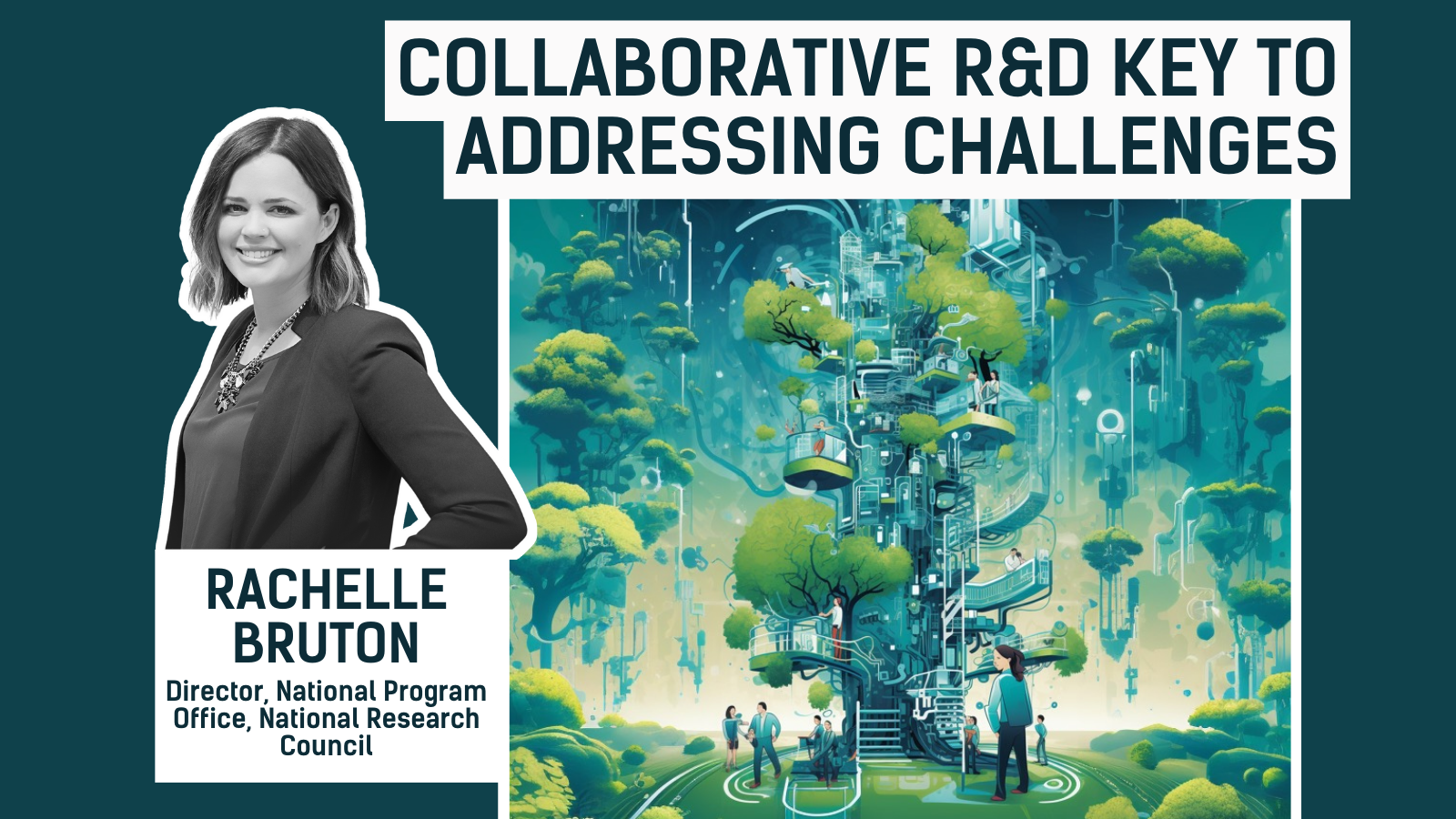Collaborative R&D key to addressing challenges

Author(s):
Rachelle Bruton
National Research Council
Director, National Program Office
Disclaimer: The French version of this editorial has been auto-translated and has not been approved by the author.
Supporting new ideas and helping researchers, businesses and academia work together creates the conditions for breakthrough technologies that benefit all Canadians. The National Research Council of Canada (NRC) Challenge programs are designed to do just that.
Through these collaborative and multi-disciplinary programs, the NRC partners with private and public sector, academic and other research organizations in Canada and internationally. They are designed to advance transformative, high-risk, high-reward research that address Canadian priorities.
The outcome-focused programs aim to deliver solutions and breakthroughs within seven years, to tackle major economic, social and environmental challenges facing Canada.
Funded through the NRC’s National Program Office and developed in consultation with stakeholders and through peer review, they bring together researchers and facilities from across the NRC with academic and industrial partners.
There are currently 10 Challenge programs at various stages of development and progress with the NRC playing a central role in convening, enabling and providing expertise. Each program is focused on different challenges facing Canada and the world.
Collaboration focuses on using AI for health and climate benefits
For example, scientists working in the Artificial Intelligence for Design Challenge program are developing ways to harness the power of AI for advancing scientific discovery for health and climate benefits, as part of a $2.5 million, 3-year project.
The process of identifying the molecules needed for a specific cause often takes more than 10 years, costs over $1 billion (US) and is a setback in many fields beyond healthcare. Artificial intelligence (AI) offers a faster, less expensive way of sorting through the large amount of data and huge candidate space to determine which molecules are the best fit.
Using AI, the team is currently accelerating the process of discovering molecules that can be used in healthcare and clean energy applications, while reducing costs. The project also focuses on molecule identification for developing green materials for clean energy, and on environmental protection, such as innovative battery technology to power electric vehicles or better methods for carbon capture and storage.
New pathways for better health and cleaner environment
“With billions of potential candidates, searching for a particular molecule can be like looking for a needle in a haystack. AI has the potential to cut years off this search,” says Harry Guo, Senior Research Officer at the NRC’s Digital Technologies Research Centre, and project lead. “Through exploration and active knowledge-seeking learning algorithms, AI can learn from both the data and experience when, where and how to explore the search space in order to better guide the molecule search.”
Guo is partnering on the project with one of the world’s leading AI researchers, Yoshua Bengio, recipient of the 2018 Turing Award (the computer science equivalent of the Nobel Prize) and founder of Mila, the Quebec Artificial Intelligence Institute. Mila is the world’s largest academic deep learning research centre and a key partner in the Pan-Canadian AI Strategy. The ultimate goal of the collaboration is to build an efficient, high-performance machine learning framework for finding molecules with designated properties.
“I believe AI-driven scientific discovery is going to be a major advancement for scientific research in general and could help us tackle critical challenges in healthcare and the environment,” says Yoshua Bengio. “I believe it is very likely this work will be extremely beneficial and transformative for both science and society. In the future, large-scale AI systems may help us come up with greater scientific theories and better evaluate the merits of competing theories to advance knowledge and drive innovation.”
Canada’s healthcare system is under enormous pressure. Additional pressures are posed by the need to reduce our greenhouse gas emissions to lessen the effects of climate change on the environment and our health. AI has the potential to ease those pressures and support the innovations we need. This project is developing the tools to make an AI-based solution a reality.
Decarbonizing construction
The NRC’s newest Challenges programs are looking to tackle an increasingly prevalent issue facing communities across Canada – accelerating decarbonization across the Canadian construction industry.
As part of the Platform to Decarbonize the Construction Sector at Scale1, the NRC is working with industry, academia, governments and other collaborators on two recently launched programs. These support the development and use of low carbon materials and systems in Canada’s construction sector, and new solutions to drive construction innovation and productivity using digital technology.
The Low Carbon Built Environment Challenge program supports the development of carbon accounting and decision support methodologies that will minimize the life-cycle carbon emissions of buildings and infrastructure. The program will make it possible to design, procure, build, retrofit and operate buildings and infrastructure that contributes to achieving the Government of Canada’s goals of net-zero emissions by 2050.
The Construction Sector Digitalization and Productivity Challenge program focuses on increasing productivity by digitalizing construction processes and accelerating innovation through performance-based regulation. It also aims to accelerate low-carbon solutions and retrofits through advanced construction practices.
Working together
As these programs are still getting started, potential collaborators are welcome to learn more about working with the NRC’s Construction Research Centre. There are also opportunities to collaborate through the other Challenge programs.
Learn more on the NRC Challenge programs website: Challenge programs – National Research Council Canada2.
References
2-https://nrc.canada.ca/en/research-development/research-collaboration/programs/challenge-programs

